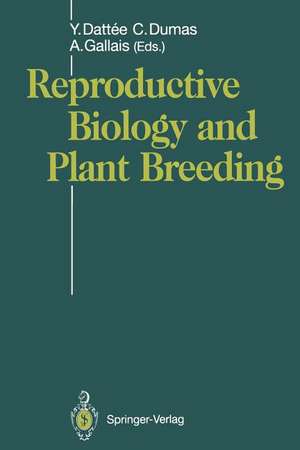Reproductive Biology and Plant Breeding: Biologie de la Reproduction et Amélioration des Plantes
Editat de Yvette Dattee, Christian Dumas, Andre Gallaisen Limba Engleză Paperback – 15 dec 2011
Preț: 649.22 lei
Preț vechi: 763.78 lei
-15% Nou
Puncte Express: 974
Preț estimativ în valută:
124.26€ • 134.13$ • 104.19£
124.26€ • 134.13$ • 104.19£
Carte tipărită la comandă
Livrare economică 19 aprilie-03 mai
Preluare comenzi: 021 569.72.76
Specificații
ISBN-13: 9783642770005
ISBN-10: 3642770002
Pagini: 476
Ilustrații: XVIII, 455 p.
Dimensiuni: 155 x 235 x 25 mm
Greutate: 0.66 kg
Ediția:Softcover reprint of the original 1st ed. 1992
Editura: Springer Berlin, Heidelberg
Colecția Springer
Locul publicării:Berlin, Heidelberg, Germany
ISBN-10: 3642770002
Pagini: 476
Ilustrații: XVIII, 455 p.
Dimensiuni: 155 x 235 x 25 mm
Greutate: 0.66 kg
Ediția:Softcover reprint of the original 1st ed. 1992
Editura: Springer Berlin, Heidelberg
Colecția Springer
Locul publicării:Berlin, Heidelberg, Germany
Public țintă
ResearchDescriere
This volume has been produced for the XI 11th EUCARPIA Congress. EUCARPIA (the European Association for Plant breeding) currently has 1.200 members, including scientists and staff of both publ ic and private organizations. Its aim is to promote scientific and technical research and cooperation In the field of plant breeding, and thereby to contribute to the development of agriculture. Every three years, EUCARPIA organizes a scientific congress. In 1992, the Xilith EUCARPIA Congress will be held In ANGERS (Fran ce) and the theme Is "Reproductive biology and plant breeding". Reproduction of plant material Is central to selection. The geneti cist, the plant breeder and the seed grower all use sexual and ve getative reproduction during the various stages of plant breeding and creation of variety. The possibility of unlimited interspecific reproduction, the use of gametogenesis dysfunction, the creation of auto and allogamy, and the cloning of the best genotypes are the challenges before the plant breeder. To understand how the reproductive system conditions the genetic structure of a population, and to Investigate the relation ships between the reproductive mode and the organization of varia bility Is a central key to genetic progress. The articles presented In this book review the current state of knowledge of reproductive biology, and Its impact on variety crea tion.
Cuprins
EC research programmes in the reproductive biology of higher plants.- Plant reproduction; past and present.- Flowering.- The control of flower formation: Exogenous and Endogenous.- Genetic and molecular enrichment steps as cloning strategy in the dioecious Melandrium album (Silene alba).- Homeotic genes directing flower development in Antirrhinum.- Gametophytic genes: basic and applied aspects.- Gametophytic and sporophytic gene expression in Helianthus annuus L.- Gametophytic gene expression.- Gametophytic competition and plant breeding.- Natural and artificial male-sterilities.- Cytoplasmic male sterility in higher plants.- Genetic engineering for fertility control.- Male sterilities and F1 hybrids in Brassica.- Doubled haploids in plant breeding.- Mechanisms of microspore embryogenesis.- The use of androgenesis in maize breeding.- Haploidy in barley and wheat improvement.- Incompatibility and hybrid production.- Sporophytic self-incompatibility.- Molecular analysis of gametophytic self-incompatibility.- The use of incompatibility in breeding programmes.- Fertilization and its potential.- Fertilization in angiosperm plants.- In vitro fertilization in flowering plants.- Wide hybridization in higher plants by applying the method of test tube pollination of ovules.- Zygotic embryogenesis.- Regulation of ABA and water stress responsive genes in maize embryos.- Gene expression during seed formation and maturation in Crucifereae.- In vitro culture of zygotic embryos: its use in soya and sunflower improvement.- Apomixis and somatic embryogenesis.- Histology of somatic embryogenesis.- Cell wall glycoprotein encoding genes in somatic and zygotic embryogenesis.- Progress in research on apomixis and its transfer to major grain crops.- Gametes and embryo conservation.- Cryopreservation of embryos.- Cryopreservation of in vitro cultures of plant cells and organs by vitrification and dehydration.- Use of cryopreservation in breeding programs.- Reproductive system and genetic resources.- Genetic diversity and reproductive system.- Reproductive systems and dynamic management of genetic resources.- Reproductive system and heterosis.- Pollen competition: genetics and implications for plant breeding.- Relationship between genetic expression and hybrid vigor in maize.- Prediction of heterosis.- Reproductive system and variety development.- The potential of inbred lines in the presence of heterosis.- The potential of hybrid varieties in self-pollinating vegetables.- Current events on plant breeding.- Developing a genetic understanding of agronomic traits with complex inheritance.- “From tradition to modernity: which right for which varieties ?”.- B. Le Buanec.- Taxon Index.







